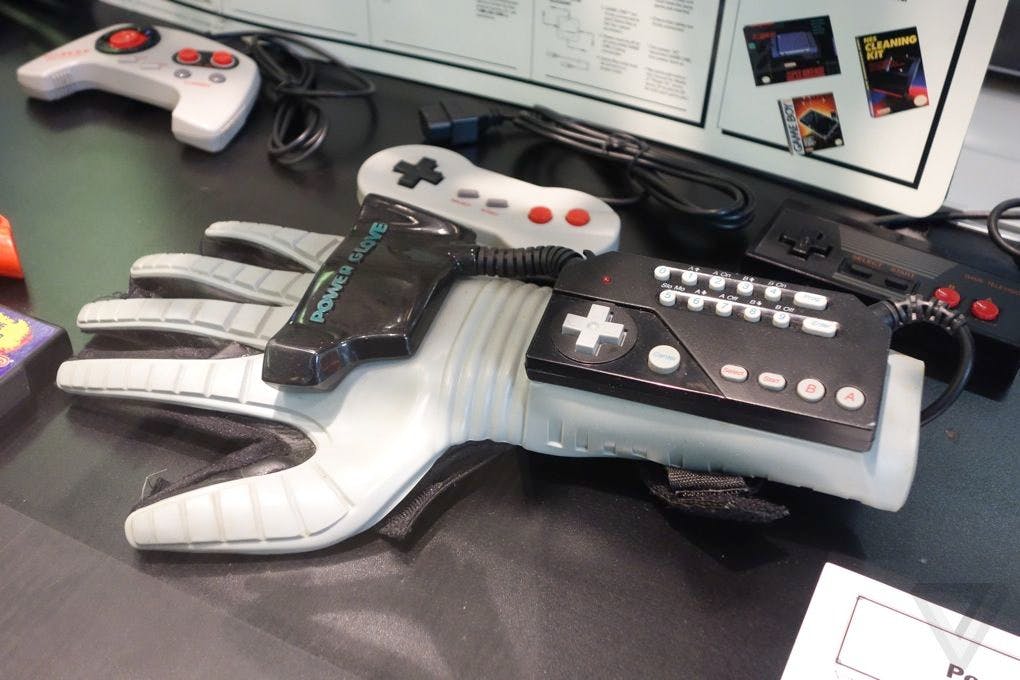When Frank Cifaldi, founder and co-director at the Video Game History Foundation, finds an unreleased original NES game on eBay, it’s cause for celebration. Unearthing never-before-published games is his “research kink,” and according to him, such discoveries only happen “once every five years.” Yesterday, he found two.
One game, Battlefields of Napoleon, got so far along in its development process that it has finalized box art, but the game never saw the light of a retail store. The other game is even rarer. It’s a demo for the infamous Power Glove developed by Rare (yes, apparently that Rare) and is one of only five known games for the peripheral in existence (if you count the two games Nintendo announced but never released). Cifaldi is now working to raise funds to win both auctions so these never-before-seen pieces of video game history can be preserved and their contents shared with the public.
Cifaldi said that while eBay saved searches are one of many tools he employs to find rare games, he actually knew Battlefields of Napoleon would be coming up for sale. In fact, he’s had the game in his hands.
“One of the services I provide is authentication of prototype items,” he told The Verge via Zoom. “If you actually look at that auction, there’s an authentication write-up by me.”
He said the owner was a former developer who worked on the game and held onto it for decades before deciding to put it up for auction. For the Power Glove game, it’s not a developer putting it on the block but the wife of the game’s designer.
“The designer, in this case, worked for a company called Novak,” he said. “They weren’t game developers, but they worked with Mattel directly on Power Glove products and did the on-paper design that was then sent to Rare to turn into a video game.”
The Power Glove game is a one-level demo that Cifaldi suspects the designer took to trade shows to see if it could generate enough interest from retailers to make it worth finishing. Obviously, that didn’t happen.
Cifaldi is not sharing how much he’s raised on behalf of the VGHF to win the auction, but he expects them to be expensive.
“Each one of these is a snowflake,” he said. “There has never been an unreleased Power Glove game available before. So is there someone who is just the world’s biggest Power Glove fan who finally has a second game to play? Is that person going to drop a hundred grand? I don’t know.”
“There has never been an unreleased Power Glove game available before.”
He’s expecting the auction to go from anywhere from $5,000 up to $10,000 and hopes the pledges and donations continue so he can be well positioned to win the auction. “The response has been really positive so far. And I’m really happy that people seem to be compelled by these things,” he said.
It’s important for the Video Game History Foundation to obtain these unreleased games and demos and others like them because it’s working against the clock. A lot of the conversation surrounding video game preservation centers taking a live game and storing it digitally in case its publishers decide to stop selling it or take it down from digital storefronts. (See additionally: Stadia, Google.) But there are often just as many cases where a cartridge kept sealed and stored is still subject to physical degradation.
“Retail games, like stuff that you actually bought in a box, you shouldn’t worry about for a really, really long time because the chips that contained the data were pressed,” Cifaldi said. “Those are meant to last a long time.”
But for these games specifically, the way they were made wasn’t with longevity in mind.
“The stuff we’re talking about here, these sort of prototypes, those are very different chips. Those are rewritable chips,” he said. “These prototype games on rewritable media could start degrading any day.”
“And that’s actually what happens,” Cifaldi continued. “They don’t just suddenly switch off. There’s a term called bit rot, and it’s exactly what it sounds like. The actual bits in the chip start like rotting slowly and changing themselves over time.”
Though these games are extremely old, Cifaldi says he’s not too worried about their contents being damaged as he’s more concerned about potentially losing out on the auction to the world’s biggest Power Glove fan.
“It’s always risky blasting this kind of thing out to the public because you risk alerting people who might want to bet against you and purchase these for their own private collections and perhaps not allow anyone to access the game data,” he said. (The Verge has not included the link to the eBay sale specifically for this reason.) Cifaldi understands and empathizes with collectors even when their goals are at odds with preservationists.
“The second that I that I put data off of a cartridge on the internet that for an unreleased game, that item is no longer worth as much money because it’s no longer one of a kind,” he said. “We are basically destroying them as collectibles in order to save them as games.”
If he doesn’t win, he does have a plan. “I just try to keep tabs on where everything is and hope and assume that an opportunity will arise eventually where I can preserve the thing,” he said. That’s something that’s happened before. But if he does win, he has plans to make the games accessible to the public in some way, and he hopes to get in contact with the developers who worked on them.
“The hope whenever we get one of these is that we not just preserve the game data — we want to preserve its story,” he said.

